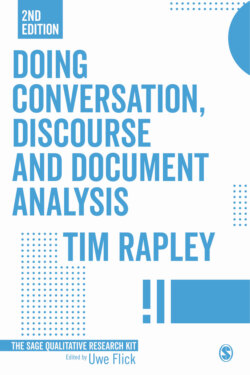Читать книгу Doing Conversation, Discourse and Document Analysis - Tim Rapley - Страница 14
На сайте Литреса книга снята с продажи.
Key points
ОглавлениеLanguage, written or spoken, is never treated as a neutral, transparent, means of communication. Instead, language is understood as performative and functional.
People studying discourse are interested in how language is used in certain contexts. The focus is on how specific identities, practices, knowledges or meanings are produced by describing something in just that way over another way.
Our understanding of things, concepts or ideas that we might take for granted are not somehow natural or pre-given, but rather the product of human actions and interactions, human history, society and culture.
Further reading
The following works go into more detail about the issues mentioned in this chapter:
Burr, V. (2015) Social Constructionism. London: Routledge.
Potter, J. (1996) ‘Discourse analysis and constructionist approaches: theoretical background’, in J. Richardson (ed.), Handbook of Qualitative Research Methods for Psychology and the Social Sciences. Leicester: BPS, pp. 125–40.
Wetherell, M. (2001) ‘Themes in discourse research: the case of Diana’, in M. Wetherell, S. Taylor and S.J. Yates (eds), Discourse Theory and Practice: A Reader. London: Sage, in association with The Open University, pp. 14–28.
